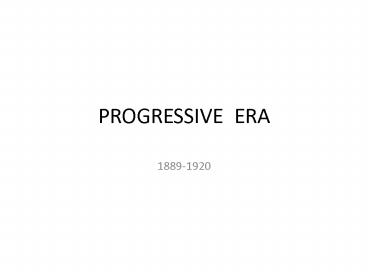PROGRESSIVE ERA - PowerPoint PPT Presentation
1 / 24
Title:
PROGRESSIVE ERA
Description:
Upton Sinclair - The Jungle. IDA TARBELL - HISTORY OF THE STANDARD OIL CO. FRANK NORRIS - THE OCTOPUS. Lincoln Steffens - The Shame of the Cities. – PowerPoint PPT presentation
Number of Views:119
Avg rating:3.0/5.0
Title: PROGRESSIVE ERA
1
PROGRESSIVE ERA
- 1889-1920
2
- Muckrakers
- Name applied in 1906 by Pres. Theodore Roosevelt
to a group of journalists who exposed the abuses
of power and corruption in American political and
business life. - They were largely responsible for mobilizing
public opinion in favor of the progressive reform
of the period.
3
Upton Sinclair - The Jungle
4
IDA TARBELL - HISTORY OF THE STANDARD OIL CO.
5
FRANK NORRIS - THE OCTOPUS
6
Lincoln Steffens - The Shame of the Cities
7
Jacob Riis - How the Other Half Lives
8
Ida B Wells Barnett - The Color Line
9
Goals of Progressivism
- Protecting Social Welfare
- Worked to soften some of the harsh conditions of
industrialization - Social gospel preached salvation through
service to the poor - Settlement house movement community centers in
slum neighborhoods that provided assistance to
people in the area - Health care
- Education
- Jobs
- Language classes
- Etc.
10
- Promoting Moral Improvement
- Wanted people to uplift themselves by improving
their personal behaviors - Ex. Prohibition Movement (ban alcoholic
beverages) - 1872 WCTU spearheaded the movement
- By 1911 - 245,000 members
- Group did much more than fight for prohibition
- Worked for suffrage
- Visited prisoners and asylums
- Opened Kindergartens for immigrants
11
3. Creating Economic Reform
- Big business often received favorable treatment
from government officials and could use its
economic power to limit competition. - Fostering Efficiency
- Put their faith into experts and scientific
principles to make society and the workplace more
efficient. - Ex. Muller v Oregon
- Justice Brandeis used data produced by social
scientists to show how working long hours
affected women and thus cost society.
12
- Scientific management - time and motion studies
to improve efficiency by breaking manufacturing
tasks into simple parts Taylorism
13
Reforms for Children, Workers, and Voters
- Movement for Social Justice
- Settlement House Movement - located in
immigrant neighborhoods - Provided services to those in the community
- Taught English
- Arts
- Music
- Childrens activities
- Health care
- Help with finding jobs
- Etc.
- Jane Adams 1889 Hull House - Chicago
14
Jane Adams
Hull House
15
Lillian Wald
Henry Street Library
16
- Child labor laws by 1914 every state had laws
on the books - 1916 Keating Owen Act prohibited the shipment
of products made with child labor, - Ruled unconstitutional in 1918.
- 1924 child labor amendment was approved by
Congress but was not ratified by the required
three-fourths states - 1938 Fair Labor Standards Act - abolished
- child labor in interstate industries.
17
2. Movement to Regulate Business and Labor
- Lochner v. New York (1905)
- A New York state law ruled that bakery workers
could not work more than 60 hours a week
including overtime. - Court declared the law illegal denied
businesses due process. - Muller v. Oregon (1908)
- An Oregon law prevented women from working more
than 10 hours a day. - Court declared the law constitutional.
- Used scientific studies for first time to help
make decision.
18
3. Reforms in the Election Process
- Initiative
- Referendum
- Recall
- Primaries
- Secret Ballot
- Many of these reforms were the results of the
Populists platform. - Wisconsin became known as the Progressive State
and Governor Robert LaFollette was known as the
father of Progressivism.
19
President Theodore Roosevelt (1901-1909)
20
Roosevelt was a conservative, but did not
hesitate to use the power of the presidency to
deal directly with social and economic
problems. Saw his job as one of stewardship -
responsible for the welfare of all. Domestic
policy became know as the Square Deal Reforms
fell into three categories
21
1. Regulating Business
- Reputation as a trust buster
- Broke up over 40 trusts during his
administration. - Saw a difference in a good trust and a bad
trust - Felt that size did not immediately make a
business bad. - Northern Securities v. U.S.
- Northern Securities was a holding company
controlled the railroad system of the Pacific
Northwest in 1904. - Supreme Court ruled that the holding company had
to be dissolved because it was in restraint of
trade.
22
- Coal Strike
- Roosevelt called labor members and owners to a
meeting to settle the strike - Court cases
- Lochner v. New York - 1905
- Muller v. Oregon 1908
- Legislation
- Elkins Act 1903 - barred rebates
- Hepburn Act 1906 gave Interstate Commerce
Commission power to nullify unreasonable railroad
rates.
23
- Commerce Dept. founded 1903
- Protecting the Consumer
- Meat Inspection Act 1906 - est. health and
sanitary conditions in the meatpacking industry. - Pure Food and Drug Act 1906 - banned harmful
additives in food and misleading advertisement. - Conserving Natural Resources
- Newlands Reclamation Act 1902 provided that
money from the sale of desert land in the West
be used to finance irrigation projects.
24
- Forest Homestead Act 1906 opened up certain
forest lands for agricultural use. - Inland Waterways Act 1907 provided for the
appointment of a commission to study the use of
the nations major rivers - National Park System - established with Gifford
Pinchot as the head. - Antiquities Act 1906 Provided that sites of
historic and/or scientific interest be placed
under national protection - 1907 barred the cutting of trees on 150million
acres - Of government timberland































